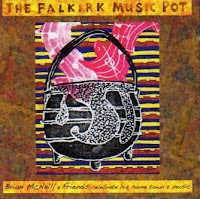MAURA KENNEDY
Villanelle: The Songs of Maura Kennedy and D. B. Love
Varése Sarabande
Records 302- 007-339-8
* * * * *
Three things we've long known: Maura Kennedy has a gorgeous
voice, she's fearless as a performer, and she doesn't do little-girl vocals.
That doesn't mean she doesn't have a softer side, though, and Villanelle highlights this–as well as
her penchant for risk, her versatility, and her willingness to air out her
lungs when the song requires it. About those risks, Kennedy took up the
ultimate challenge. In a meeting with California-based poet B. D. Love, the two
cooked up an audacious scheme: he would compose original poetry and she would
write appropriate melodies–no word changes, no choruses, no repetition, no
clichés. The result: An absolutely stunning album that alters moods, tempos,
and styles more often than Cher changes costumes. You know from the get-go
you're in for a treat. The album's title and opening track references a
demanding style of 19-line poetry consisting of five tercets (three line that
create a complete poem) followed by a quatrain. Try writing a melody for that!
Now try to make it sound as gorgeous as what Kennedy composed. It's hard to
describe, but it's simultaneously complicated, fragile, beautiful, and
mystically evocative of the open spaces of the West. It, and songs such as the
folk rocker "Bicycles with Broken Spokes," the old-time-laced "Mockingbird,"
and the Tex-Mex weepy "Borrowed Dress" are evocative of classic
projects from Nanci Griffith and Tish Hinojosa.
Kennedy is also known, of course, for her work with her
husband, Pete, which uses harder-edged material to create counter-balance when
things get too smooth. On this album, Maura recreates that effect by donning
different personae and musically transporting us to alternative musical
landscapes. There is, for instance, the bluesy "She Worked Her Magic onMe," a song in the Bayou spirit of "Black Magic Woman;" the
torchy "I'll Be Alone Tonight," which would be at home at an
after-midnight Texas honky-tonk; and several songs that mash country with hints
of sad East Coast girl-group material from the early 1960s, including
"Breathe Deeply Love" and "Darling Cutter." That effect on
the last song is especially a nice bit of legerdemain, given that Cutter is a
young man who is the damaged product of abusive parents who escapes into a
world of self-inflicted wounds and Internet porn. If that's not enough mood
changes for you, there's also "Fireflies," a Kennedy original and the
only lyrics Love did not pen. Its echoic vocals and faintly medieval melody are
reminiscent of some of Jacqui McShee's post-Pentangle offerings. For heaven's
sake, there's even a Christmas song on this album! If you know anything about
B.D. Love, it goes without saying that his lines are metrical and imaginative. Best
of all, they are like the villanelle–complex
in style but, if done right, so steadfast in their clarity that we notice only
the way they stir.
Rob Weir





